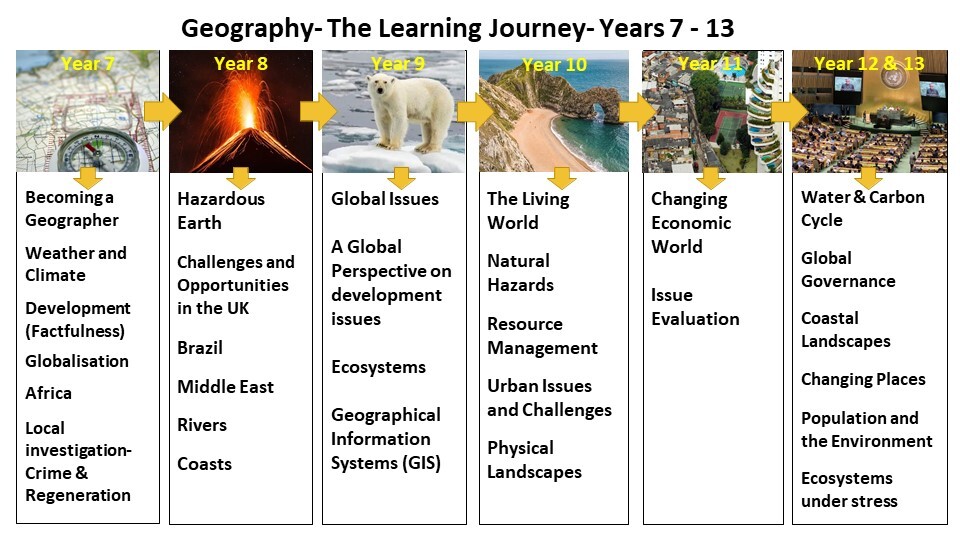- Home
- Secondary
- Subject Information
Geography
BackIntroduction
- You enjoy learning about people and their societies, economies, cultures and the environment
- You want to understand more about the physical environment around us, and how it is changing
- You are keen to learn and develop a wide range of skills
Aims and Ethos
Our aim is to ensure that all students leave Tabor with a good understanding of the world around them.
In geography, we believe in creating a culture of success, celebrating the achievements of all students, and creating opportunities for all students to achieve to their full potential. Our aim is that students will:
- Use geographical vocabulary in their geography work
- Understand the difference between a number of scales
- Learn about the human and physical features of places at a range of scales and how they interact to produce an effect
- Develop empathy
- Learn how geography links with other subjects and its importance in the world we live in today
- Take responsibility for their own development through enquiry, independent study, initiative and maximising their potential
- Gain skills in analysing and reasoning so they can produce a logical argument with an informed conclusion

KS3
At KS3 pupils will cover a range of human and physical geographical topics:
| Year 7 | Year 8 | Year 9 | |
|---|---|---|---|
|
Autumn 1 7 Weeks |
Becoming a Geographer |
Hazardous Earth |
Global Issues |
|
Autumn 2 7 Weeks |
Weather and Climate |
Challenges and Opportunities in the UK |
Global Issues |
|
Spring 1 6 Weeks |
Development (Factfulness) |
Brazil |
A Global Perspective on Development Issues |
|
Spring 2 6 Weeks |
Globalisation |
Middle East |
A Global Perspective on Development Issues |
|
Summer 1 6 Weeks |
Africa |
Rivers and Flooding |
Ecosystems |
|
Summer 2 7 Weeks |
Local investigation- Crime and Regeneration |
Coasts |
GIS |
KS4
Pupils will be studying the AQA GCSE course, which is assessed in 3 exams at the end of year 2. Controlled assessment (coursework) is no longer part of the GCSE. Instead, there is an exam on Geographical Applications and skills based on fieldwork and geographical skills learned over the 2 years. There are also exams on Living with the physical environment and Challenges in the human environment.
What will you study and how will you be assessed?
Unit 1 – Living with the physical environment
Assessed by a 1 hour 30 minute exam (35% of GCSE grade).
In this unit you will study:
- The Challenge of natural hazards – tectonic and weather hazards and climate change
- The Living World – ecosystems, tropical rainforests and cold environments
- Physical landscapes in the UK – coastal and river landscapes
Unit 2 – Challenges in the human environment
Assessed by a 1 hour 30 minute exam (35% of GCSE grade).
In this unit you will study:
- Urban issues and challenges – the urban world, urban change in the UK and sustainable urban development
- The changing economic world – the development gap, Nigeria and the Changing UK economy
- Resource management – Food, water and energy
Unit 3 – Geographical applications and skills
Assesd by a 1 hour 15 minutes exam (30% of GCSE grade).
For this unit, you will carry out physical and human fieldwork to collect data. Recent studies have included coastal process and management at Walton on the Naze and human fieldwork in Braintree. The paper is made up of 3 sections:
- Issue evaluation
- Fieldwork
- Geographical skills
Curriculum Statement
What are the field trip opportunities?
Trips:
Y7 – Epping Forest with the Field Studies Council introducing Geography and skills in practice
Y8 – Natural History Museum and a residential in Norfolk learning about coastal and river processes with some fun personal development activities on the last day.
Y9- Colchester Zoo trip to look at animal adaptations and conservation, Duke of Edinburgh Bronze award is offered.
Y10- Walton-on-the-Naze physical fieldwork as part of the GCSE geographical skills paper
Y11- Stratford or Braintree for the GCSE human fieldwork.
Useful Links
Below are listed just a few useful websites to both help students enhance their learning in geography:


